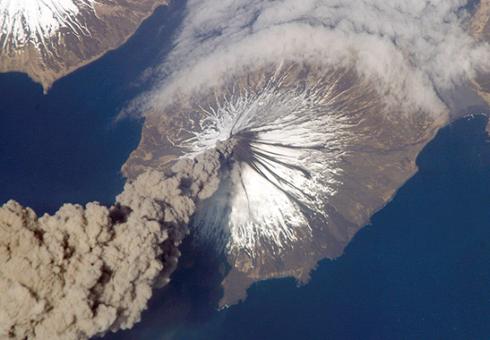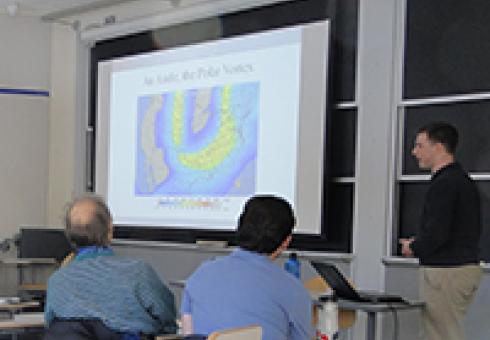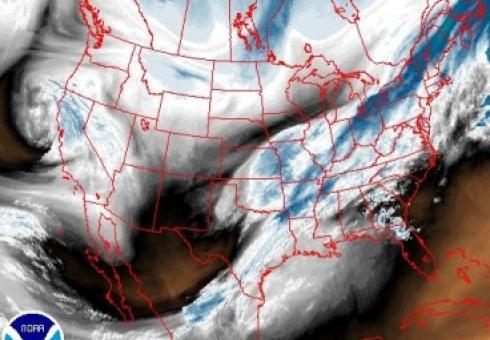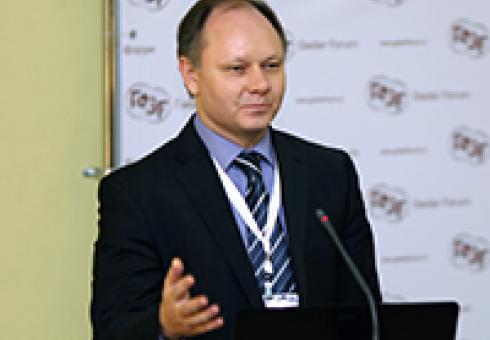News + Media
Alli Gold Roberts
MIT Joint Program on the Science and Policy of Global Change
By the late 1990s, scientists had observed more than two decades of rapid global warming, and expected the warming trend to continue. Instead, despite continuing increases in greenhouse gas emissions, the Earth’s surface temperatures have remained nearly flat for the last 15 years. The International Panel on Climate Change verified this recent warming “hiatus” in its latest report.
Researchers around the globe have been working to understand this puzzle—looking at heat going into the oceans, changes in wind patterns, and other factors to explain why temperatures have stayed nearly stable, while greenhouse gas concentrations have continued to rise. In a study published today in Nature Geoscience, a team of scientists from MIT and elsewhere around the U.S. report that volcanic eruptions have contributed to this recent cooling, and that most climate models have not accurately accounted for the effects of volcanic activity.
“This is the most comprehensive observational evaluation of the role of volcanic activity on climate in the early part of the 21st century,” says co-author Susan Solomon, the Ellen Swallow Richards Professor of Atmospheric Chemistry and Climate Science at MIT. “We assess the contributions of volcanoes on temperatures in the troposphere—the lowest layer of the atmosphere—and find they’ve certainly played some role in keeping the Earth cooler.” 
There are many components of the Earth’s climate system that can increase or decrease the temperature of the globe. For example, while greenhouse gases cause warming, some types of small particles, known as aerosols, cause cooling. When volcanoes erupt explosively enough, they enhance these aerosols—a phenomenon referred to as “volcanic forcing.”
“The recent slowdown in observed surface and tropospheric warming is a fascinating detective story,” says Ben Santer, the lead author of the study and a climate scientist at Lawrence Livermore National Laboratory. “There is not a single culprit, as some scientists have claimed. Multiple factors are implicated. The real scientific challenge is to obtain hard quantitative estimates of the contributions of each of these factors to the so-called slowdown.”
The researchers verified the cooling phenomenon by performing two different statistical tests to determine whether recent volcanic eruptions have cooling effects that can be distinguished from the intrinsic variability of the climate. The team found evidence for significant correlations between volcanic aerosol observations and satellite-based estimates of both tropospheric temperature and sunlight reflected by the particles off the top of the atmosphere.
“What’s exciting in this work was that we could detect the influence of the volcanic aerosols in new ways. Using satellite observations confirmed the fact that the volcanic particles reflected a significant amount of the sun’s energy out to space, and of course losing energy means cooling—and the tropospheric temperatures show that too,” explains Solomon, who is also a researcher with MIT’s Joint Program on the Science and Policy of Global Change. “There are still uncertainties in exactly how big the effects are, so there is more work to do.”
Alan Robock, a professor of environmental sciences at Rutgers University and a leading expert on the impacts of volcanic eruptions on climate, says these findings are an important part of the larger climate picture. “This paper reminds us that there are multiple causes of climate change, both natural and anthropogenic, and that we need to consider all of them when interpreting past climate and predicting future climate.”
“Since none of the standard scenarios for evaluating future global warming include volcanic eruptions,” Robock adds, “this paper will help us quantify the impacts of future large and small eruptions when they happen, and thus better interpret the role of humans in causing climate change.”
This research was led by a team at Lawrence Livermore National Laboratory and builds upon work Solomon conducted in 2011, finding that aerosols in an upper layer of the atmosphere—the stratosphere—are persistently variable and must be included in climate models to accurately depict climate changes.
The research was supported by the U.S. Department of Energy.
In climate change, science and policy are inextricably linked—more so than in most contemporary social phenomena. The complexity of understanding earth’s systems generates uncertainty, which feeds into an imperfect policy process that often warps ideal economic instruments beyond recognition. Without clear recognition of this linkage, the resulting mixture is frequently less than appetizing. This January, we continued an MIT Joint Program on the Science and Policy of Global Change tradition of presenting to the MIT community the basics (and some of the nuance) of this complex issue over a two-session Independent Activities Period (IAP) course.
While the minutiae of a 3-dimensional atmosphere and ocean model may be daunting (and require clusters of networked high-performance computers to complete a run), it turns out we can understand a lot about climate change from simplified models that build on basic physics accessible to any first-year undergraduate. Fundamental principles, such as energy balance, yield straightforward arguments about why the Earth should warm as we add greenhouse gases to its atmosphere. Those same principles can also be used to frame simple predictions about how future warming might proceed—information that policymakers and analysts can use to help plan for the future.
Considering climate change as an “externality” (a cost imposed on society by individuals and companies without compensation), economists have developed theories of how to reduce environmental impacts by appealing to pocketbooks. Putting a price on pollution (e.g., carbon tax) or selling and trading “rights” to pollute (e.g., cap-and-trade) are two common policy levers to encourage polluters to cut back while lessening the overall economic impact. When we couple our global climate models with global economic models (collectively, the Integrated Global System Modeling framework – IGSM), we can better understand the complex interactions between human activities and earth system changes.
We are invariably asked: Do we prefer to tax or to trade? Strictly economically speaking, if we have perfect information on the damages from climate change and the costs required to mitigate, the two should be equivalent. However, accounting for uncertainties on both ends of the human-earth interaction, we find that our answer from a strictly modeling perspective depends on which we can estimate better: the social cost of carbon (the total cost to society of the externality) or the “tipping point” thresholds of irreversible climate change? This is an area of ongoing research.
Policy-makers tend to respond to what they can see, an important part of the policy-science nexus of climate change. Typhoon Haiyan, which devastated the Philippines last November, stood as a stark reminder of the human suffering from extreme weather events—as did Hurricanes Sandy and Katrina on the domestic front. Hitting land just as the annual UN climate talks opened in Poland, Haiyan (or Yolanda, in the Philippines) became an impetus for international efforts there to create the beginnings of a “Warsaw Mechanism”, an international compensation scheme for loss and damage resulting from climate change. Predicting how the frequency and severity of such storms will change in a warming world is a crucial research focus, particularly as society builds more densely along coasts and in floodplains and exposes itself to more potential economic and personal loss.
Ultimately—unlike the Earth’s orbit—no policy issue exists in a vacuum. As we described examples of current efforts in the US, China and the EU to reduce greenhouse gas emissions, it is rare that the best of both science and economics are captured by policies in practice. The prevailing politics have a large impact on where the needle lands—tax, trade or other—and indicate an even bigger challenge that lay before us, not as scientists but as citizens.
Daniel Rothenberg and Daniel Gilford are graduate students in MIT’s Department of Earth and Planetary Sciences. Michael Davidson and Arthur Yip are graduate students in MIT’s Engineering Systems Division.
Genevieve Wanucha
Program in Atmospheres, Oceans and Climate
IAP 2014 was bone-chilling, and thanks to 12.310, An Introduction to Weather Forecasting, 20 new amateur forecasters can tell you why.
Always offered between semesters, 12.310 reveals the principles of fluid dynamics that govern the atmosphere’s movement. In lectures, real forecasting exercises, and a trip to WBZ TV’s on-air weather center, students learn where newsrooms get their daily weather predictions — and how they can make their own.
“Our aim is that students come to understand that weather forecasting is not guessing and is based on real science,” says Lodovica Illari, senior lecturer in synoptic meteorology in MIT’s Program for Atmospheres, Oceans, and Climate (PAOC), who has taught the course for 20 years. “We hope the students get interested in fluid dynamics and come back and do some more.”
To reveal the laws governing the atmosphere’s motion “in action,” Illari used demonstrations with MIT’s Weather in the Tank materials. In one class, Illari rotated a cylindrical tank of water on a turntable to emulate the dynamics of Earth’s atmosphere. A bucket of ice at the tank’s center created a temperature gradient. As students peered in, Illari dropped ink into the water to make visible the small currents forming in the water, demonstrating the conditions that create weather systems.
12.310 stands as a yearly reminder of MIT’s distinguished history in weather forecasting. In fact, Carl-Gustaf Rossby, who transformed weather forecasting into an atmospheric science, founded the country’s first meteorology program at MIT in 1928. A line of prominent MIT faculty meteorologists followed, including Jule Charney, Norman Phillips, Victor Starr, and Edward Lorenz. The fundamental contributions to fluid dynamics made by these past professors resonate in MIT’s modern-day research into much longer-time-scale atmospheric phenomena such as climate.
As the students of 12.310 learned the basics of weather forecasting, they came to appreciate an insight of Professor Lorenz’s that changed meteorology forever. At MIT in 1961, Lorenz found that rounding a few digits off one decimal number in a computer weather simulation changed its projected long-term pattern. He had discovered the big implications of the chaos theory principle of “sensitive dependence on initial conditions” for weather prediction. Slightly imprecise measurements, even single-digit differences in dew point, can skew long-term forecasts. The chaotic nature of short-term weather places a limit of less than 10 days on accurate forecasts.
To make their own forecasts, the students used raw data spit out of weather prediction models run at the National Weather Service, which are read out in maps of the temperature, air pressure, dew point, wind, and moisture across the country. With that information, the students anticipated the likely passage of warm or cold weather fronts by searching for regions of strong gradients in temperature or moisture and shifts in wind direction. The class ended with a TV-style presentation of the day’s weather and a Boston weather forecasting competition. This year, Fiona Paine ’17 took home the prize of a digital indoor/outdoor thermometer.
The course was organized and taught by Illari and co-instructor Jeff Scott, a research scientist at PAOC and the Center for Global Change Science, along with teaching assistants Casey Hilgenbrink ’15 and PAOC graduate student Vince Agard ’11, who are both members of the MIT Weather Forecasting Team.
Many of the undergraduates signed up for 12.310 to get a taste of the kind of science they could pursue in PAOC. Others said that knowing how to predict the weather is just plain useful. And everyone found the class eye-opening. “It was surprising to me just how difficult it can be to predict tomorrow's weather, even when using the newest technology,” says Oren Katzen ’16. “I will be certain to be more forgiving to the weatherman in the future.”
By Michael Davidson
It is quite a challenge to pin down an electricity system that has grown 10.8 percent annually over the last decade, doubled power generation in just 7 years and added 80-90 gigawatts (GW) – the equivalent of the United Kingdom’s entire generating capacity –every year.
Nevertheless, some preliminary year-end statistics recently published by central agencies (NEA, NBS,CNREC) offer an interesting, though imperfect, snapshot of China’s power sector in 2013.
Notably, after a lull in 2012, electricity demand growth recovered last year owing to resurgent industrial demand. Coal retained its share in terms of capacity factor, while wind saw a rise in capacity factors indicating that some measures to improvement integration have had an impact. The “Big Five” state-owned generating companies – which collectively own 47 percent of Chinese generating capacity – made record profits in 2013, and the top electricity regulator was rolled into the top energy policy body in an attempt to streamline oversight.
Let’s take a spin through the 1,250 GW Chinese electricity system…
Electricity demand rebounds with heavy industry-led growth
In 2012, electricity demand growth fell to 5.6 percent, its lowest rate since 1998. In contrast, 2013 saw electricity growth regain 1.6 percentage points, to 7.2 percent growth for the year. While GDP grew at the same 7.7-7.8 percent rate in both years, last year’s surge in electricity demand was driven by anuptick in heavy industry-led growth. Crude steel production grew 7.5 percent compared to 3.1 percent in 2012, while the automobile production sector grew 18.4 percent, almost three times faster than in 2012. As over 70 percent of electricity production in China goes to satisfy industry demands, this readjustment drove national power sector demand (see figure, throughout, historic data is from the CEC– China Electricity Council.) More...
Alli Gold Roberts
MIT Joint Program on the Science and Policy of Global Change
Black carbon is one of the most potent air pollutants that contributes to global climate change, and is produced by the incomplete combustion of fossil fuels and forest fires. While scientists have known about the role of black carbon for decades, there’s been limited research to calculate global emissions. Now, MIT and National University of Singapore (NUS) researchers have developed a new method to calculate global black carbon emissions.
In a study published in last week’s Journal of Geophysical Research, the researchers calculated the global total of black carbon emissions at 17 teragrams a year between 2000 and 2005. This result is significantly larger than the majority of global air pollution modeling studies, which employ a bottom-up approach. One such study found humans emitted only 7.5 teragrams of black carbon per year during the same five-year period—less than half the new estimate.
“Our results are the first to produce a global top-down estimation of the emissions of black carbon,” says Chien Wang, a senior research scientist with the Joint Program on the Science and Policy of Global Change and co-author of the study.
The top-down method used by Wang and his co-author Dr. Jason Cohen of NUS relies on gathering data from air measurement stations and satellites to sufficiently cover every region of the globe. In this study, data was collected from 238 different stations. They then compiled this data and used inverse modeling to determine the emissions from each of the major pollution regions.
“Current emissions inventories are mainly obtained by adding up estimates of emissions from ever sector of the economy and the environment to obtain a global estimate. This method creates uncertainty in the projections,” says Wang. “Our method eliminates some of these uncertainties by more accurately factoring in population and economic changes around the globe.”
The differences in the emissions estimates are most apparent in China and Southeast Asia. Wang predicts this is the result of the bottom-up method not capturing the rapid socioeconomic growth that has occurred in this region over the past 15 years.
Black carbon enters the atmosphere as small particles and warms the planet by absorbing heat and reducing the ability of the Earth to reflect light back out to space.
Because black carbon plays a key role in air pollution and global climate change, it is essential for policymakers to have an accurate picture of the severity of the problem.
“This top-down method isn’t perfect and still creates some unknowns in the estimates produced,” Wang says, but he suggests that combining both approaches would potentially improve estimates and further eliminate uncertainty. “We hope this work will open the door to further efforts to better quantify and reduce uncertainty in black carbon emissions estimates.”
More: Reprint 2014-1
The Global Young Academy (GYA) is an international group of two hundred young (up to ten years post PhD) scientists selected based on research excellence and commitment to impact. Through GYA, members are linked to the senior international academy network IAP, meet outstanding leaders of the international science community and may be nominated to contribute to international policy statements and working groups. Appointments are for a period of four years.
Selin's research focuses on using atmospheric chemistry modeling to inform decision-â€making strategies on air pollution, climate change and toxic substances including mercury and persistent organic pollutants. She has also published articles and book chapters on the interactions between science and policy in international environmental negotiations, in particular focusing on global efforts to regulate hazardous chemicals and persistent organic pollutants.
Selin, who will be formally appointed at a GYA symposium on May 21st, says she is very much looking forward to leveraging her new appointment to expand the reach of her science-policy work and educational initiatives.
By Michael Craig, Amanda Giang, Colin Thackray 

What’s the difference between climate change, the Northern spotted owl, and acid rain?
That question is not the beginning of a bad joke. Rather, it was the type of question that lay at the heart of the class ‘Science, Politics, and Environmental Policy’ offered this past fall at the Massachusetts Institute of Technology. For the first time, the class was co-taught by Professors Susan Solomon of Earth, Atmospheric and Planetary Sciences and Judy Layzer of Urban Studies and Planning – an interdisciplinary team that drew students from diverse backgrounds across MIT’s schools and departments. Through weekly case studies, the class aimed to better understand how the United States has dealt with environmental problems and the multifaceted role of science in that process.
Each week, students focused on a different environmental issue, ranging from historical examples like the use of lead in gasoline, to currently unfolding debates, like the environmental impacts of unconventional shale gas production. Through reading, writing, and discussion, students explored how and why these issues entered the policy agenda (or didn’t), evolving policy responses, and how science fit into the picture. While fast and hard conclusions were elusive, as the class drew to a close students reflected on several themes that emerged over the course of the semester: the complexity of the policy-making process, the convoluted path that science takes from its origin to its use in policy, and the importance of storytelling for communicating science effectively.
Opening the black box of policy-making
Many of us initially saw the policy process as a black box – we could see the inputs (mainly science) and outputs (environmental policy), but did not fully grasp how one led to the other. Over the course of the semester, we came to a far better understanding of what levers exist to influence the policy-making process.
Some of those levers are litigation, direct involvement in the political process, and communication to the public. Each can influence the conversion of inputs to outputs, but vary in effectiveness under different circumstances. In part, such circumstances emerge from existing economic and political institutions, which can constrain policymaking and create path dependency. Recognizing these realities through case studies demonstrated the importance of looking at policy issues from different angles and thinking carefully about the best strategy for effecting change.
The path from science to policy
As we peeled the lid off the black box of policymaking, we also began to recognize how convoluted the path science travels from generation to use in policymaking can be. Science does not pass directly from academics to policymakers, but rather is filtered and translated by many individuals. These individuals – and even scientists themselves – have differing values, biases, and goals that can lead them to different interpretations of, and conclusions from, science. What role, if any, should scientists play along science’s path from lab to policy? Do scientists who act as advocates harm the credibility of science as a whole, and if so, does this harm outweigh the potential benefits? For scientists who act as the ‘experts’ that communicate the scientific basis of environmental issues to non-scientists, how do their biases and values shape their actions and their interpretation of science? If science is being filtered and reinterpreted, how can we ensure the veracity of information we receive that is purportedly "based on science”?
Stories matter
Over the course of the semester, the importance of storytelling also emerged as a major theme. In many of the cases we studied, public engagement was a key driver for policy action, so effectively communicating with and reaching the public is crucial. Doing so requires the ability to tell a clear story – to communicate information (scientific or otherwise) clearly, concisely, and in a way that is relevant to the audience. Focusing on what you know can help in putting forth a clear narrative, and while uncertainties are important to convey, they do not need to be the focus of communication.
There is no easy formula for developing strong environmental policies, nor are there simple rules for how science should be involved. That said, 'Science, Politics, and Environmental Policy' helped us develop a more nuanced understanding of the complex policy-making process, and gave us tools to engage in it strategically, and with self-awareness. Rarely is there an opportunity to discuss the many-layered environmental policy system with students with such diverse expertise. The confluence of ideas and points of view from the varied backgrounds of both the students and professors resulted in a unique learning experience for this collection of young environmental scholars.
Colin Thackray is a graduate student in MIT's Department of Earth, Atmospheric and Planetary Sciences working with Noelle Selin. Amanda Giang and Michael Craig are graduate students in MIT's Engineering Systems Division.
Sergey Paltsev, assistant director for economic research at the MIT Joint Program on the Science and Policy of Global Change, presented at the 2014 Gaidar Forum entitled "Russia and the World: Sustainable Development."
The expert discussion “Green growth” and sustainable development” was dedicated to such topics as energy efficiency and renewable energy as the drivers of economic growthas economic growth drivers. Besides it focused on the perspectives of “the third industrial revolution”, which is not a new idea, however it opens the prospects for efficient energy use.
Oleg Lugovoy, Research Advisor, Center for Economic Modeling of Energy and Environment, RANEPA, Jeffrey Sachs, Director of the Earth Institute and Professor of Columbia University, Hillard Huntington, Executive Director of Energy Modeling Forum, Stanford University, Emmanuel Guérin, Associate Director of Sustainable Development Solutions Network (SDSN), Frederic Vidal, President of Université de Nice Sophia-Antipolis, Sergey Paltsev, Assistant Director for Economic Research of MIT Joint Program on the Science and Policy of Global Change of the Massachusetts Institute of Technology, John Laitner, Resource Economist and Independent Consultant of Economic and Human Dimensions Research Associates and Glen Peters, Senior Research Fellow of the Center for International Climate and Environmental Research of Norway, took part in the discussion.
In his opening remarks, the moderator Oleg Lugovoy defined the vector of the discussion: “It’s a discussion on how to achieve high growth rates and improve life quality without causing harm to the environment.” He also noted that the problem could not be solved by the efforts of business and public organizations alone, but depends on economic regulation.
John Laitner turned the participants’ attention to the task of increasing the quality of energy efficiency giving USA as an example, where 86% of all energy is spent to no purpose. Inefficient use of energy leads to huge costs and is a factor limiting, in Russia as well, the potential for economic development. The expert underlined that the idea of the third industrial revolution which consists of combination of interactive communications and new green technologies is getting more important.
Jeffrey Sachs reminded the participants of the discussion about the idea of a prominent Russian economist Nikolai Kondratyev on periodic economic cycles (waves) linking it to the concept of a shift in technological modes. Each of them had limited resources, but never before has the scale of economic activity been so impressive and the number of population so huge (7.2 billion people). “90 trillion dollars – this is the volume of the annual economic output,” Jeffrey Sachs noted, “and this figure tends to grow progressively. So do the CO2 emissions as well. Already today 38 billion tons of СО2 are annually emitted into the Earth’s atmosphere,” the expert noted.
However, changing the energy system profoundly and substantially over 40-50 years is quite a challenge. One of the possible solutions is to switch to alternative types of fuel or renewable energy sources. Nuclear energy, if it is safe, also has a high potential. But the most important thing, according to the expert, is to reduce coal consumption, in particular, “convince China, the country which consumes this fuel in huge volumes, to do so.”
The report by Hillard Huntington marked a turn in the discussion to the subject of shale gas. The expert noted numerous uncertainties pertaining to shale gas extraction. It is still difficult to evaluate the outlook for price policy in this field unambiguously, which is caused not only by the way it is extracted, but also the volumes of gas supply.
Sergey Paltsev agreed with his colleague. He immediately dotted the i’s noting the “platitude” of shale gas: “It does not differ from the common methane, the difference lies in the method of extraction which consists in subsurface fracture.” Answering the question “whether Gazprom has overslept shale gas revolution or not”, the expert agreed with the estimation given by the Prime Minister of the Russian Federation Dmitry Medvedev who said that “this question is quite complicated.” “Gazprom has enough gas and it can go without shale gas, given proper investment and price policy,” Mr. Paltsev summarized. He also noted that the consequences of fraction are difficult to predict. Besides, the use of huge amount of water during extraction makes its benefits ambiguous, at the same time CO2 emissions from the use of natural gas are far from zero, therefore it is impossible to say that its production can address the problem of emissions globally.







